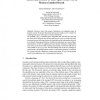Free Online Productivity Tools
i2Speak
i2Symbol
i2OCR
iTex2Img
iWeb2Print
iWeb2Shot
i2Type
iPdf2Split
iPdf2Merge
i2Bopomofo
i2Arabic
i2Style
i2Image
i2PDF
iLatex2Rtf
Sci2ools
108
click to vote
KI
2001
Springer
2001
Springer
Theory and Practice of Time-Space Trade-Offs in Memory Limited Search
Having to cope with memory limitations is an ubiquitous issue in heuristic search. We present theoretical and practical results on new variants for exploring state-space with respect to memory limitations. We establish Ç´ÐÓ Òµ minimum-space algorithms that omit both the open and the closed list to determine the shortest path between every two nodes and study the gap in between full memorization in a hash table and the information-theoretic lower bound. The proposed structure of suffix-lists elaborates on a concise binary representation of states by applying bit-state hashing techniques. Significantly more states can be stored while searching and inserting Ò items into suffix lists is still available in Ç´ÒÐÓ Òµ time. Bit-state hashing leads to the new paradigm of partial iterative-deepening heuristic search, in which full exploration is sacrificed for a better detection of duplicates in large search depth. We give first promising results in the application area of co...
Artificial Intelligence | Bit-state Hashing Techniques | Heuristic Search | KI 2001 | Memory Limitations |
| Added | 30 Jul 2010 |
| Updated | 30 Jul 2010 |
| Type | Conference |
| Year | 2001 |
| Where | KI |
| Authors | Stefan Edelkamp, Ulrich Meyer |
Comments (0)

